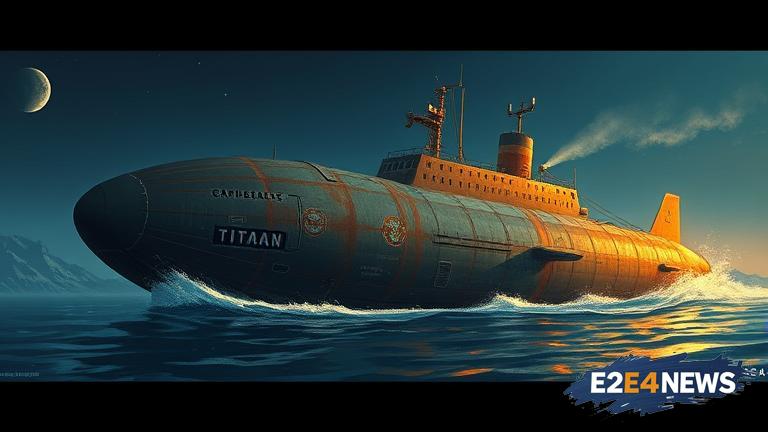The Canadian government has come under scrutiny for its involvement with the company behind the doomed Titan submersible. According to recent reports, the Department of Fisheries and Oceans provided support to OceanGate, the firm responsible for the submersible. The Titan submersible was on a dive to the Titanic wreck site when it imploded, resulting in the tragic loss of five lives. The incident has raised questions about the safety protocols in place for such expeditions and the role of government agencies in supporting these ventures. The Department of Fisheries and Oceans has stated that its support was limited to providing information and guidance on marine conservation and sustainability. However, critics argue that the government should have been more vigilant in ensuring the safety of the expedition. The Titan submersible was on a tourist expedition to the Titanic wreck site, which is located over 12,000 feet below the surface of the North Atlantic Ocean. The submersible was designed to withstand the extreme pressure of the deep sea, but it appears to have failed catastrophically. The incident has sparked an outpouring of grief and condolences from around the world. The families of the victims have been left to pick up the pieces and try to make sense of the tragedy. The investigation into the incident is ongoing, and it is likely to take several months to determine the cause of the implosion. In the meantime, the Canadian government is facing questions about its role in supporting the expedition. The Department of Fisheries and Oceans has stated that it will cooperate fully with the investigation and provide any necessary information. The incident has also raised questions about the regulation of deep-sea expeditions and the need for more stringent safety protocols. The International Maritime Organization has guidelines in place for deep-sea expeditions, but these are not always enforced. The incident has highlighted the need for greater oversight and regulation of these expeditions. The Canadian government has announced that it will conduct a review of its policies and procedures for supporting deep-sea expeditions. The review will examine the role of government agencies in supporting these ventures and the need for more stringent safety protocols. The incident has also sparked a debate about the ethics of deep-sea tourism and the impact it can have on the environment. The Titanic wreck site is a protected area, and there are concerns that the expedition may have caused damage to the site. The incident has raised questions about the balance between preserving the environment and allowing for scientific research and exploration. The Canadian government has stated that it will take a balanced approach to regulating deep-sea expeditions, taking into account both the need for scientific research and the need to protect the environment. The incident has also highlighted the need for greater international cooperation on regulating deep-sea expeditions. The International Maritime Organization has called for greater cooperation and coordination among countries to ensure that deep-sea expeditions are conducted safely and responsibly. The incident has sparked a global conversation about the need for more stringent safety protocols and greater oversight of deep-sea expeditions. The Canadian government has announced that it will work with international partners to develop new guidelines and regulations for deep-sea expeditions. The incident has also raised questions about the role of private companies in conducting deep-sea expeditions. OceanGate, the company behind the Titan submersible, has faced criticism for its safety record and its handling of the incident. The company has stated that it will cooperate fully with the investigation and take steps to improve its safety protocols. The incident has highlighted the need for greater transparency and accountability in the deep-sea expedition industry. The Canadian government has stated that it will take steps to ensure that companies operating in the industry are held to high standards of safety and environmental responsibility.
